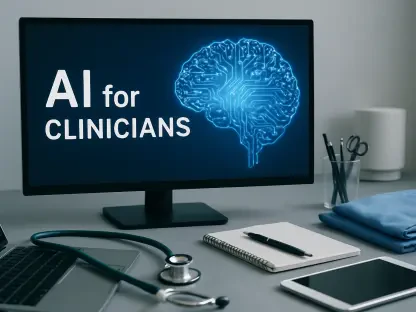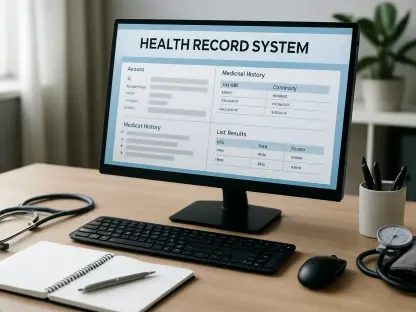In the ever-evolving landscape of healthcare technology, the integration of Artificial Intelligence (AI) is anticipated to radically shift the experiences of both patients and clinicians by 2026, according to a recent survey conducted by Healthcare Dive and Microsoft. This survey gathered insights from 130 healthcare executives, revealing a projected 320% growth in AI adoption for clinical documentation alone over the next few years. This marks a significant leap from AI’s current applications, which primarily focus on revenue-related functions, such as scheduling, patient check-ins, and coding. These areas have the highest existing implementation rates, standing at 40%, 40%, and 31%, respectively. The current landscape highlights healthcare leaders’ emphasis on financial gains in the early stages of AI adoption.
Shifting Priorities: From Financial Gains to Enhanced Experiences
Once these revenue-centric functions are adequately addressed, the survey indicates that healthcare leaders are ready to delve deeper into AI applications beyond financial priorities to enhance patient and clinician experiences. Clinical documentation, a traditionally labor-intensive and problematic area, exemplifies this shift. The anticipated growth in AI-driven clinical documentation, projected to rise dramatically from 10% to 42%, underscores the sector’s eager embrace of AI solutions to streamline processes and reduce manual workloads.
Beyond clinical documentation, other notable areas expected to see significant growth include clinical decision support, predicted to surge from 8% to 39%. Meanwhile, patient education and engagement are forecasted to grow from a mere 2% to 33%. This broader application of AI signifies a pivotal move toward not only optimizing financial operations but also improving the overall quality of care delivered. These developments highlight a growing readiness among healthcare leaders to deploy AI in ways that simplify clinical processes, aid decision-making, and engage patients more effectively.
Real-World Applications and Proven Benefits
Illustrating the real-world promise of AI in healthcare, Jared Pelo, Chief Medical Information Officer at Microsoft, emphasizes this next phase of adoption by focusing on automation in historically challenging areas. AI-assisted clinical documentation is poised to allow physicians more time to concentrate on patient interactions while delegating routine record-keeping to technology. This shift is not merely theoretical; practical applications present strong evidence. For instance, at Stanford Health Care, 96% of physicians found AI tools for documentation easy to use. Furthermore, about two-thirds of these practitioners noted time savings, demonstrating the tangible benefits AI integration can offer.
Nevertheless, the future of AI in healthcare encompasses a seamless blend into everyday workflows, delivering a multidimensional resource accessible to all. Microsoft’s Dragon Copilot solution epitomizes such integration. Combining natural language voice dictation with ambient listening and generative AI, this tool aims to streamline clinical workflows, enabling clinicians to perform administrative tasks with unprecedented speed, accuracy, and security. Such advancements reflect the continuous movement towards more efficient, tech-enabled clinical environments, fostering enhanced patient care experiences.
Toward Consumerization of Healthcare: What Lies Ahead
As AI continues to penetrate deeper into healthcare systems, the evolution marked as “part two” is set to further revolutionize patient and clinician satisfaction. This transition signifies a move towards the “consumerization” of healthcare, wherein healthcare visits are expected to become more engaging and satisfying experiences, facilitated by a suite of AI technologies. Enhanced patient care, improved clinician workflows, and comprehensive engagement strategies will become hallmarks of this next phase.
The survey’s insights outline a clear vision for the imminent surge in AI adoption within healthcare, indicating that as AI technologies mature, their applications will extend far beyond financial efficiencies. This progression toward leveraging AI to elevate the patient and clinician experience represents a significant evolution poised to reshape the healthcare industry fundamentally. By 2026, the landscape could be markedly different, characterized by AI-driven innovations that not only enhance operational efficiencies but also profoundly impact the quality and delivery of care.
Concluding Thoughts: Preparing for An AI-Enhanced Future
Once revenue-focused tasks are tackled, healthcare leaders are ready to explore AI’s potential beyond financial aspects to improve patient and clinician experiences. One area showcasing this shift is clinical documentation, traditionally known for being labor-intensive and problematic. The expected rise in AI-driven clinical documentation, projected to soar from 10% to 42%, highlights the industry’s eagerness to adopt AI solutions for streamlining processes and lessening manual workloads.
In addition to clinical documentation, other areas poised for significant AI-driven growth include clinical decision support, which is expected to jump from 8% to 39%. Patient education and engagement are also set to increase significantly, from just 2% to 33%. This expanded use of AI marks a crucial step toward not only optimizing financial operations but also enhancing the overall quality of care. These advancements indicate that healthcare leaders are increasingly ready to leverage AI to simplify clinical workflows, support decision-making, and better engage patients, ultimately improving the care experience.









